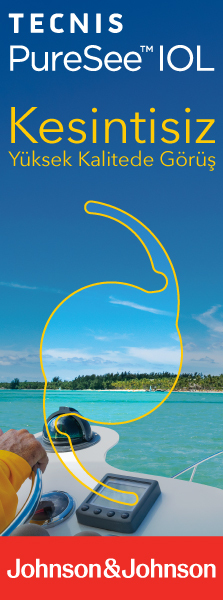2M.D. Professor, Umraniye Training and Research Hospital, Eye Clinic, Istanbul/TURKEY Purpose: To evaluate efficacy of intravitreal bevacizumab treatment in type 1 idiopathic macular telangiectasia (IMT).
Materials and Methods: 8 eyes of 8 type 1 IMT patients who receieved intravitreal bevacizumab between 2009-2014 were included in this study. All the patients had ophthalmological examination involving best corrected visual acuity (BCVA), dilated fundus examination, spectral domain optical coherence tomography (SD-OCT) and fluorescein angiography (FA). Patients were examined one week and one month after the intravitreal injection. Intravitreal injection was repeated in patients whom macular edema persisted/increased. Changes in BCVA, central macular thickness (CMK) and central macular volume from baseline at 1 month after the first injection and at final examination were evaluated.
Results: Average age of the patients that consist of six female and two male was 58±8,2. Average follow up period was 25±17 months. During this time 4,5 (range 1-12) injections were performed. Average BCVA of the patients was 0.42±0.30 due to Snellen chart. BCVA increased from baseline at final follow up in five patients, decreased in two patients and remained stable in one patient. Average CMT of the patients which was 409±185 µm at baseline decreased by 22±70 µm at 1 month after the first injection and 51±133 µm at final follow up. CMT decreased from baseline at final follow up in five patients, increased in three patients.
Conclusion: Variable results of intravitreal bevacizumab shows the necessity of patient based evaluation for the treatment. Controlled studies with larger patient groups can show the effect of intravitreal bevacizumab on disease progression more efficiently.
Keywords : Type 1 idiopathic macular telangiectasia, intravitreal bevacizumab, macular edema




